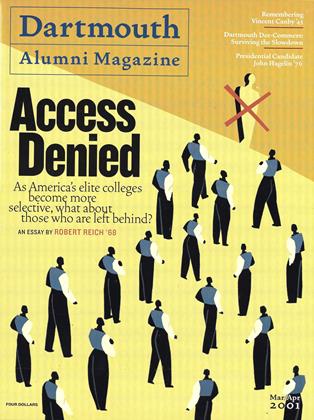The Tucker Foundation's new dean believes he was born to steer students toward volunteer service.
Dartmouth's Tucker Foundation, a center for character, moral and spiritu al development through service and reflection, has a new dean. Stuart Lord, 41, came from DePauw University in Greencastle, Indiana, where he was associate dean of the university and executive director of the Hartman Center for Civic Education and Leadership. Lord has two masters degrees from Princeton and a doctor of ministry degree from United Theological Seminary in Dayton, Ohio. Lord also served as executive director of President Bill Clintons. "Summit for Americas Future," held in 1997. The summit, chaired by General Colin Powell and attended by 5,000 participants, called for the United States to make a greater investment in its younger people. DAM caught up with Lord shortly after he started his new job in the fall.
Why is it important for Dartmouth studentsto serve the community?
The world is a community. Students have an obligation to be full participants in the community, utilizing all of the resources available to them. The definition of an educated person must include a life of service and civic participation. We educate our students to become leaders and servants.
What does it take to generate an interestin community service among today'scollege students?
You have to have a message and a strategic plan. You have to have a vision, and you have to have the public relations to articulate that vision. You have to get people involved who weren't involved and ask them to bring their friends along. You try to match people up with their passions. Once people get connected to their passion, community service becomes a part of their life, even if they never had thought they would serve or would have time to do it. When I started at DePauw University, 25 percent of the student body was involved in community service. When I left, 93 percent of the campus was involved in service.
A little more than half of Dartmouthstudents get involved in service programs.How will you boost participation?
We're looking at developing a number of options. We may create a summer program for young people to come from inner cities to be at Dartmouth and have the sophomore class staff it—sort of a summer enrichment program.
Do you have ideas for students whowant to volunteer but have difficulty takingtime away from their studies?
One is an urban plunge program, where students can do 48 hours in inner cities around the country; do service and come back for reflection. They will have a supervisor who will serve as a mentor. I hope that from the experience they would be challenged to think about ways to further that experience.
Can you give an example of somethinga Dartmouth student might do in a 48-hour plunge?
I think the Dartmouth student would have to be willing to become a servant. If you are going to be a servant in a homeless shelter, then you have to serve where the need is greatest. And when people leave in the morning, cleaning the place is the greatest need. And you have to be willing to reflect. As you're serving, you're reflecting. Reflection is where the learning really can take place. We can serve and we can make a difference, but growth happens when reflection happens.
What did you learn at DePauw that willhelp you here?
At DePauw about 75 percent of the students were involved in Greek life. Dartmouth has less that that. Even so, there is a huge opportunity to begin to strategically think about how you develop programs in the Greek system.
Is there anything you would like to dothrough the Tucker Foundation to getDartmouth students to discuss anyracial tensions that may exist?
I think there is a time and place for dialogue. You need to go into people's space, where they already feel comfortable. Call up a fraternity and say, "Can we have a discussion about community, can we have a discussion about symbols that can be misinterpreted that can lead to a racial incident?" You can't expect people to come across the street to a discussion on race. They will only come across the street if there's a crisis. The other way you do it is that you deliberately bring people together in a service project.
How do you avoid burning out?
I realize, without a question in my mind, that I was made for this. I was made to create opportunities for people to get involved, to create a community. I believe in the power of communities, an inclusive community, people of all cultures and races working together. I dream of that. It's part of my DNA.
Stuart Lord
Henry Homeyer is an associate editor for People, Places and Plants magazine. He livesin Cornish, New Hampshire.
 View Full Issue
View Full Issue
More From This Issue
-
 Cover Story
Cover StoryThe Opportunity Divide
March | April 2001 By ROBERT REICH ’68 -
 Feature
FeatureRisky Business
March | April 2001 By JAMIE HELLER ’89 -
 Feature
FeatureThe Chemistry of Crime
March | April 2001 By CHRISTOPHER KELLY ’96 -
 Personal History
Personal HistoryA Critical Relationship
March | April 2001 By Christopher Kelly ’96 -
 Article
ArticleSeen & Heard
March | April 2001 -
 Article
ArticleNorth Campus Takes Shape
March | April 2001
Interviews
-
 Interview
InterviewHomeward Bound
JULY | AUGUST 2021 -
 Interview
InterviewLOOK WHO’S TALKING
MARCH | APRIL 2020 By Betsy Vereckey -
 Interview
Interview“Responding to Reality”
Jan/Feb 2004 By Lisa Furlong -
 Interview
InterviewNew Dean Arrives
May/June 2008 By Lisa Furlong -
 INTERVIEW
INTERVIEW“Fat Don’t Fly”
Jan/Feb 2010 By LISA FURLONG -
 Interview
InterviewLook Who’s Talking
JANUARY | FEBRUARY 2021 By Madison Wilson '21

